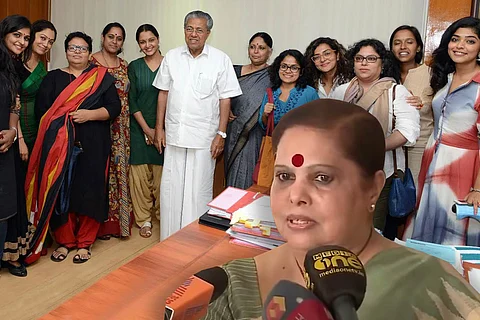

When it formed quietly in July 2017, or submitted a report two-and-a-half years later, the Hema Committee had not received a lot of attention in Kerala. Two more years went by before anything more was heard about the Committee, put together by the Government of Kerala’s Ministry of Cultural Affairs explicitly to study the issues faced by women in the Malayalam film industry. The Committee was formed a few months after a prominent actor in Kerala was sexually assaulted in an attack allegedly masterminded by another actor, Dileep. Several women who immediately came out in support of the survivor actor had formed a collective in three months – the Women in Cinema Collective (WCC) – and asked the government to conduct such a study. Their photo with Chief Minister Kerala Pinarayi Vijayan from the May 2017 meeting is still circulated as an iconic moment for the industry, which has infamously been subjected to male domination for ages.
Despite the immediate action taken to form the committee, however, the state government's delay in acting on the report submitted at the end of 2019 invited questions, concerns and criticism. The WCC and other concerned individuals shot off RTI enquiries seeking an answer, but all it yielded was a vague reply that the contents of the Hema Committee report were confidential. The government has been giving varied reasons for not putting out the findings in public or even tabling them in the Assembly.
When the Opposition Congress asked why the findings were not tabled, Chief Minister Pinarayi Vijayan responded that what they formed was not a ‘Commission’, but a ‘Committee’, which therefore did not come under the purview of the Commission of Inquiry Act. The Opposition argued that this was a mere technicality used as an excuse not to reveal the committee’s findings. In an interview to TNM, lawyer and activist Harish Vasudevan explained the difference between the two terms.
"If it is a Commission, they could in their fact-finding exercise call upon people and ask them to make their statements under an oath. What they present before the government will be considered facts, unless it is challenged. It is then the duty of the executive (government) to place the action-taken report before the legislature. However, a Committee has no statutory validity. It need not be a fact-finding panel, and can be just one constituted by the government to advise it. So when the report is submitted, the government will have no statutory duty to do anything about it. In this particular case, it was the government's decision to form a Committee in place of a Commission, which means the government will have no statutory obligation to reveal the findings. Even so, the state has a constitutional duty to let the public know about the content, since the Committee was formed using money from the public exchequer," Harish said.
Another reason cited by Cultural Affairs Minister Saji Cherian for not tabling the findings of the Hema Committee is that the report was too huge and ran into thousands of pages.
But the most cited reason concerns the privacy of the women who spoke to the Hema Committee about their experiences of gender discrimination and sexual harassment in the industry. Minister Saji and Justice Hema have repeatedly stated that those women's identities had to be protected. However, the WCC and activists asking for the release of the findings pointed out that they can still be published without compromising on confidentiality.But the Information Commission rejected RTI enquiries even for the parts that did not reveal the identity of the women, saying that even if their names were withheld, the circumstances of their experiences may still give them away.
Under further pressure, the government went on to release a one-and-a-half page document of the recommendations made by the Hema Committee. However, the contents of this document were so vague that none of the stakeholders, including the WCC and others, could figure out what was implied. After the government called a meeting with various film bodies – the first such – to discuss the report in May this year, actor and WCC member Padmapriya said that the results were more inconclusive than before.
The reluctance by the government, which had initially seemed proactive on the matter, has led to speculations that the report contains the names of very powerful individuals. Harish pointed out that if the government that had shown the courage to put a powerful actor like Dileep behind bars for months was now backtracking, it should mean the report contains names more powerful than that of Dileep.